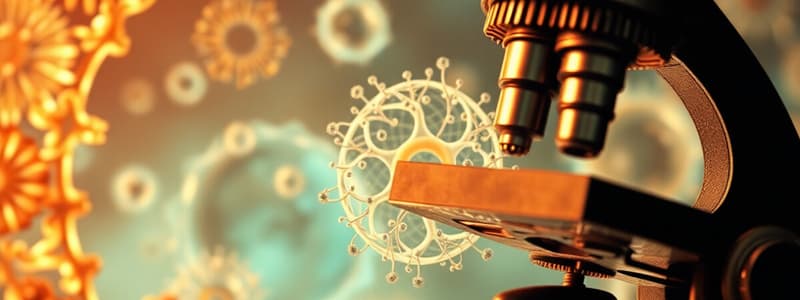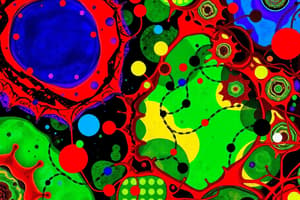Podcast
Questions and Answers
What significant evolutionary milestone occurred about 1 billion years ago?
What significant evolutionary milestone occurred about 1 billion years ago?
- Origin of multicellular organisms
- Emergence of eukaryotes (correct)
- Arising of prokaryotes
- Development of photosynthesis
Which of the following groups are considered examples of eukaryotes?
Which of the following groups are considered examples of eukaryotes?
- Bacteria and Archaea
- Archaea and Viruses
- Viruses and Algae
- Fungi and Protists (correct)
Which cellular structure is unique to eukaryotic cells?
Which cellular structure is unique to eukaryotic cells?
- Cytoplasm
- Ribosomes
- Nucleus (correct)
- Cell membrane
What does the endosymbiotic theory explain?
What does the endosymbiotic theory explain?
What type of cells lack nuclei and organelles?
What type of cells lack nuclei and organelles?
Which of the following statements is true regarding common features of prokaryotes and eukaryotes?
Which of the following statements is true regarding common features of prokaryotes and eukaryotes?
What is the meaning of the term 'organelle'?
What is the meaning of the term 'organelle'?
What key difference distinguishes prokaryotic cells from eukaryotic cells?
What key difference distinguishes prokaryotic cells from eukaryotic cells?
What was Robert Hooke's significant contribution to cell biology?
What was Robert Hooke's significant contribution to cell biology?
Which scientist is known as the 'Father of Microbiology'?
Which scientist is known as the 'Father of Microbiology'?
What was a key finding of Matthias Schleiden in 1838?
What was a key finding of Matthias Schleiden in 1838?
What advancement did Leeuwenhoek introduce to microscopy?
What advancement did Leeuwenhoek introduce to microscopy?
According to the cell theory, what does Rudolph Virchow's conclusion entail?
According to the cell theory, what does Rudolph Virchow's conclusion entail?
What is the primary focus of the study of cells?
What is the primary focus of the study of cells?
Which statement represents a characteristic of all eukaryotic cells?
Which statement represents a characteristic of all eukaryotic cells?
What evidence contributed to the development of the cell theory?
What evidence contributed to the development of the cell theory?
What is the basic unit of structure and function in living things?
What is the basic unit of structure and function in living things?
Which statement is a tenant of the Modern Cell Theory?
Which statement is a tenant of the Modern Cell Theory?
How do prokaryotic cells primarily differ from eukaryotic cells?
How do prokaryotic cells primarily differ from eukaryotic cells?
What is the composition of cells generally recognized to be?
What is the composition of cells generally recognized to be?
Which of the following is NOT true about prokaryotic cells?
Which of the following is NOT true about prokaryotic cells?
What measurement unit is equivalent to one micrometer (µm)?
What measurement unit is equivalent to one micrometer (µm)?
What characteristic is common to both prokaryotic and eukaryotic cells?
What characteristic is common to both prokaryotic and eukaryotic cells?
Which option describes eukaryotic cells?
Which option describes eukaryotic cells?
Flashcards are hidden until you start studying
Study Notes
Introduction to the Cell
- Cell theory is foundational in biology, explaining the essence of living organisms.
- The microscope played a crucial role in the discovery and understanding of cells.
Historical Contributions
- Robert Hooke (1665) observed cork slices, coining the term "cells."
- Anton van Leeuwenhoek (1674) vastly improved microscope design, achieving 300x magnification; observed microscopic life, earning the title "Father of Microbiology."
- Matthias Schleiden (1838) concluded that all plants consist of cells.
- Theodor Schwann (1839) determined that all animals are made of cells.
- Rudolph Virchow (1855) proposed that all new cells arise from preexisting cells, further advancing cell theory.
Cell Theory
- Traditional Cell Theory:
- Living beings are composed of one or more cells; all cells arise from existing cells.
- Cells are the fundamental unit of structure and function in living organisms.
- Cells possess specialized structures for essential life functions.
- Modern Cell Theory:
- Energy flow (metabolism) occurs within cells.
- Cells contain hereditary information (DNA) transferred during cell division.
- Cells of similar species exhibit chemical composition uniformity.
Cell Size
- Cells are on the micrometer scale; 1 µm equals 1/1,000,000th of a meter.
- Organelles are smaller, measured in nanometers.
Types of Cells
- Cells are categorized as prokaryotic or eukaryotic.
- All cells possess a cell membrane and DNA.
Prokaryotic Cells
- Smaller, simpler, and more primitive; evolved before eukaryotic cells.
- Lack a nucleus and membrane-bound organelles.
- Examples include bacteria such as Staphylococcus and Escherichia coli.
Eukaryotic Cells
- Larger and more advanced than prokaryotes; contain a nucleus.
- Have specialized functions and numerous internal membranes around organelles.
- Include all cells in multicellular organisms and some unicellular organisms.
- Evolved from prokaryotic cells approximately 1 billion years ago.
- Examples include protists, fungi, animals, and plants.
Origin of Eukaryotic Cells
- The Endosymbiotic Theory suggests eukaryotic cells evolved from prokaryotic communities.
- Mitochondria and chloroplasts are thought to have originated from engulfed prokaryotes.
Common Features of Prokaryotes and Eukaryotes
- Both types of cells have a cell membrane, cytoplasm, DNA, and ribosomes.
- They perform all essential life activities.
Organelles
- Organelles function like specialized organs within a cell.
- The nucleus, a prominent organelle, houses the cell's genetic material (DNA).
Key Differences
- Prokaryotic Cells: Do not have a nucleus or organelles; primarily bacteria.
- Eukaryotic Cells: Possess a nucleus and organelles; includes plants, animals, fungi, and protists.
Useful Mnemonic
- "Eu Do" signifies that Eukaryotes have a nucleus, while "Pro No" indicates that Prokaryotes do not.
Review Topics
- Key events leading to the development of cell theory.
Studying That Suits You
Use AI to generate personalized quizzes and flashcards to suit your learning preferences.




